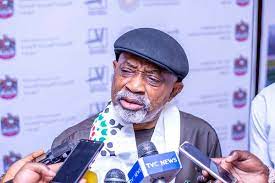Ngige rejects bill preventing emigration until 5-year mandatory service
By Jeph Ajobaju, Chief Copy Editor
Labour Minister Chris Ngige has described as “unworkable” a bill at the National Assembly (NASS) seeking to restrict the emigration of Nigerian doctors to overseas for greener pastures.
The bill seeks to mandate medical and dental graduates for five years to serve in Nigeria before being granted a practising licence.
Ngige told journalists after an extraordinary Federal Executive Council (FEC) meeting in Abuja that the bill violates existing labour laws.
A member of the House of Representatives from Lagos State, Ganiyu Johnson, who sponsored the bill, explained it aims to check the mass exodus of medical personnel from the country.
In reaction, the Nigerian Association of Resident Doctors (NARD) has announced plans for a five-day warning strike, vowing to resist any guise to “enslave” Nigerian doctors.
The NARD also demanded, among others,
- Immediate increment in the Consolidated Medical Salary Structure to 200 per cent of the current gross salaries of doctors
- Immediate implementation of CONMESS
- Domestication of the Medical Residency Training Act
- Review of hazard allowance by all the state governments as well as private tertiary health institutions where any form of residency training is done
__________________________________________________________________
Related articles:
MDCAN urges NASS to jettison health workers’ anti-emigration bill
Healthcare delivery suffers as 57,000 nurses leave Nigeria
NMA repeats health sector collapse warning as Nigerian doctors in UK increase to 10,296
__________________________________________________________________
‘Nobody can stop doctors from getting full licence’
“Nobody can say they [doctors] will not get a practising licence until after five years. It will run contrary to the laws of the land that have established the progression in the practice of medicine,” Ngige insisted, according to The PUNCH.
“The bill in the National Assembly cannot stop anybody from getting a full licence. That bill is a private members’ bill. In the National Assembly, they attend to private members’ bills and executive bills.
Executive bills come from the government to the NASS with the stamp of the executive.
“It is either sent by the Attorney General of the Federation or by the President, but usually from the Attorney General of the Federation. So, it’s not an executive bill, it’s a private member’s bill,” Ngige clarified.
“That document is, as far as I am concerned, not workable. Ab initio, I don’t support it and I will never support it.
“As I said before, it is like killing a fly with a sledgehammer. They should think of other ways if they are trying to check brain drain, there should be other ways.”
Ngige said the planned strike by the NARD is unnecessary since the government is already engaging with the Nigerian Medical Association (NMA), the umbrella body of all medical practitioners.
“On the demand for a 200 per cent salary increase, the NMA is the father of all doctors in Nigeria and they have about four or five affiliates of which the resident doctors are an association.
“So, NMA is discussing with the Federal Ministry of Health, salaries income and wages commission and the Ministry of Labour, and we know that NMA has accepted a salary increase of between 25 and 30 per cent across the board for their members.
“So, I don’t know the logic by which people who are members of NMA are now coming up to say pay us 200 per cent increase. I don’t understand it.
“I have called the NMA President to contact them because, on the issue of remuneration negotiation, it’s NMA that the government deals with.
“So, I have told the President of NMA to contact them and we will engage them. They should not go on any strike, it’s not necessary.”













